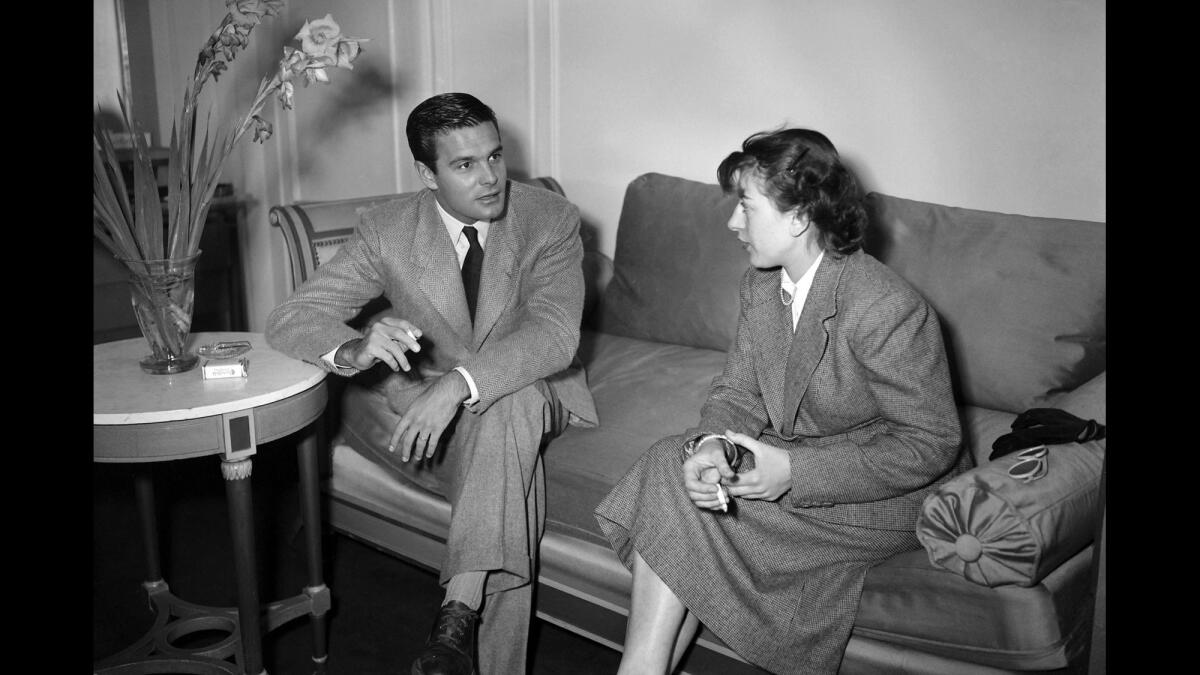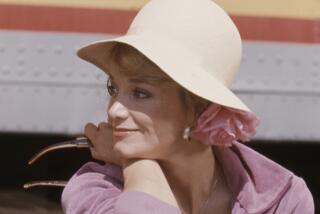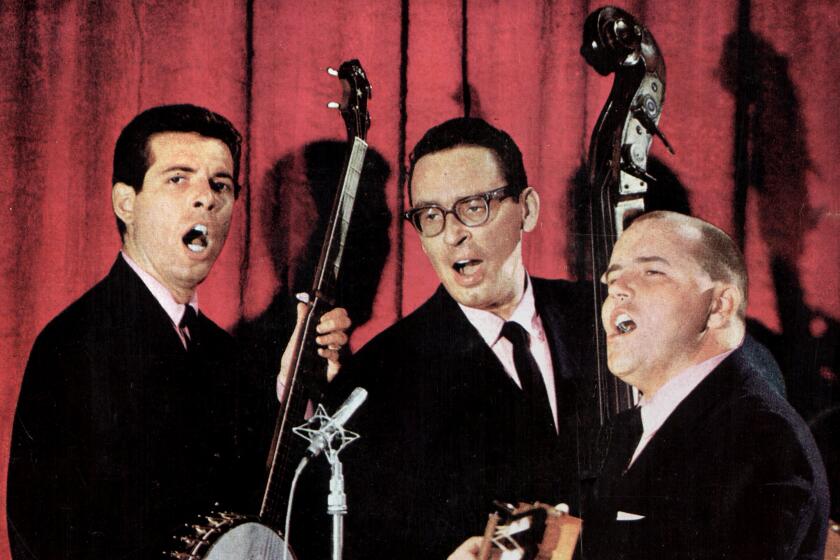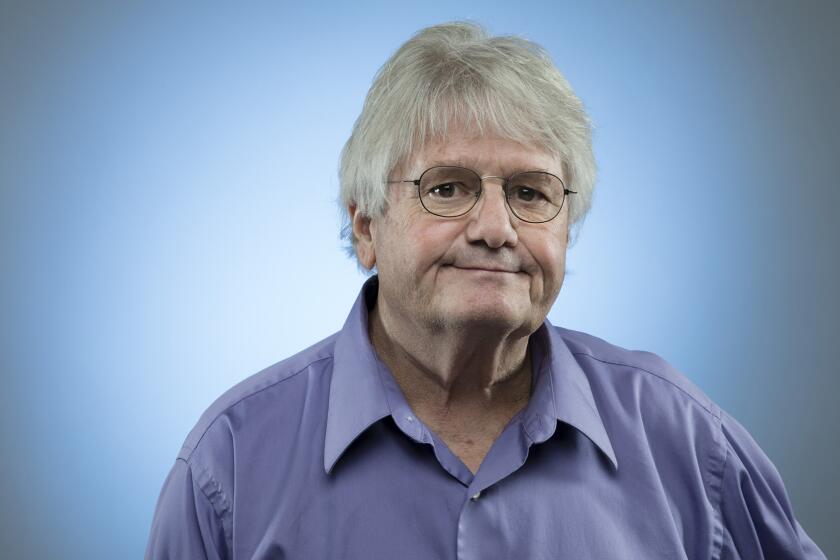Louis Jourdan, dashing Frenchman who co-starred in ‘Gigi,’ dies at 93

Movie director Vincente Minnelli and lyricist Alan Jay Lerner were far along in planning the 1958 musical “Gigi” without casting the role of Gaston, the worldly playboy who falls in love with the title character. Finally, they met with dashing French actor Louis Jourdan.
“He certainly looked the part,” Minnelli wrote in his 1974 memoir, “I Remember It Well.”
After discussing the role, Minnelli said, Jourdan brightly asked, “You know what I love about this character of Gaston?”
“What?” Minnelli asked.
“He’s so bored!” Jourdan answered, and he got the part. It turned out to be the defining role of his career, much, as it turned out, to his chagrin.
Jourdan, 93, died Saturday at his home in Beverly Hills. He had been in failing health for some time, said Olivier Minne, who is writing Jourdan’s authorized biography.
In a career that spanned more than 50 years, Jourdan played key roles in scores of films and TV shows, but felt he was too often stereotyped as the European lover, complete with charming accent.
“That ooh-la-la, conventional, embarrassing character,” he complained in a 1965 interview with the Associated Press. “I’m proud to be a Frenchman, but I resent the image people have of the stupid, continental charmer.
“Against that type of role I fight pitilessly.”
Robert Osborne, film historian and host of the Turner Classic Movies cable channel, said Jourdan was indeed capable of serious work in roles such as the callous concert pianist he played in the 1948 movie “Letter From an Unknown Woman” that has become a film-buff favorite.
But at the time it came out, the film didn’t do Jourdan’s career much good. “Audiences didn’t want to see him in that kind of role,” Osborne said in an interview with The Times. “I think he’s right that he was stereotyped.
“He was hired for his profile.”
Louis Jourdan was born Louis Gendre on June 19, 1921, in Marseille, France. His parents ran hotels in the South of France and as a young man he studied theater in Paris. In 1939, Jourdan won his first film role in “Le Corsaire,” which starred Charles Boyer. The film was not completed because of the approaching war, but around that time — possibly on the set of the film – photographer Raymond Voinquel took a sultry picture of a shirtless Jourdan that was published in a French magazine.
During the German occupation of France, Jourdan and his family were involved in the resistance movement, according to several sources, and he worked as an actor in a few films, some of which didn’t make it into theaters until after the occupation. Movie mogul David O. Selznick saw his work and signed him to a contract to make films in Hollywood, the first of which was Alfred Hitchcock’s 1947 “The Paradine Case,” with a stellar cast that included Gregory Peck, Charles Laughton and Ethel Barrymore.
But that movie was not considered one of the director’s best, and though Jourdan worked almost steadily, his early films in the U.S. didn’t do well. “I was a star without one box-office hit,” he told Hedda Hopper in 1951.
Osborne said Jourdan’s career suffered repeatedly from bad timing. “Selznick was so good at guiding actors’ careers, making sure they were in the best pictures for them,” Osborne said. “But at the time Jourdan could have used that guidance, Selznick was having financial troubles.”
Although Selznick had produced one of the biggest hits of all time, 1939’s “Gone With the Wind,” by the late 1940s he was heavily in debt due to several box-office disappointments, including “The Paradine Case.” Selznik sold Jourdan’s contract in 1950 to Darryl F. Zanuck, and much stereotyping ensued.
The actor finally scored a major hit with “Gigi,” in which he appeared with Leslie Caron and Maurice Chevalier. Jourdan, who spends much of the period film in tailored three-piece suits and top hats, was not the easiest actor to work with, according to Caron. In her 2009 autobiography, “Thank Heaven,” she said Jourdan was often unhappy with Minnelli’s staging, but “he poured his grudges out on me. I was quite exhausted to hear, every time the camera stopped, his litany of grievances.”
A half-century after the film was made, however, she wrote that “I now stand in admiration of his charm and his melodious voice.”
“Gigi” was Jourdan’s biggest hit in a leading role, though he appeared in another big musical, “Can-Can” in 1960, and in 1963 he was in the highly successful drama “The V.I.P.s” in which he was third billed, just below Elizabeth Taylor and Richard Burton. In the 1960s, he also appeared in several French films.
Although often disappointed in his film parts, he scored a critical success in 1954 on Broadway with an adaptation of the Andre Gide story “The Immoralist,” in which he played opposite Geraldine Page and James Dean. There were disappointments in that field too, however.
In 1965 he was cast as the male lead in the Broadway-bound musical “On a Clear Day You Can See Forever” but was replaced during out-of-town tryouts by John Cullum. In the 1980s Jourdan was in a touring, stage version of “Gigi” in the older Chevalier role, but he took a critical drubbing, in part because he lip-synced songs.
Jourdan acted in several early television shows and starred in the detective series “Paris Precinct” on ABC in 1955. But it was another example of bad timing, Osborne said, hurting his image as a film actor. “At that point, television was a place for actors on their way out,” he said, “or new actors who had not yet made it in film.”
As Jourdan grew older, he was able to mostly shake off the typecasting. In the 1980s he had roles as villains, most famously in the 1983 James Bond movie “Octopussy,” and in the horror films “Swamp Thing” (1982) and “The Return of Swamp Thing” (1989). His last film appearance, again as a villain, was in the 1992 adventure-romance “Year of the Comet.”
Jourdan and his wife, Berthe, better known by her nickname Quique, were married in 1946, according to Minne. They led mostly quiet lives but were popular figures among their peers in Hollywood. He was known for his love of classical music and classic literature.
Tragedy struck in 1981 when their only child, Louis Jr., died of a drug overdose. The coroner’s report listed the death as a suicide.
In 2010 the actor — seen walking with the help of a cane and assistance from others — received the French Legion of Honor award, presented in Los Angeles by the French ambassador to the United States. Among the crowd of friends at the ceremony were Sidney Poitier and Kirk Douglas.
Jourdan had no immediate survivors. Quique Jourdan died last year.
Twitter @davidcolker
More to Read
Start your day right
Sign up for Essential California for the L.A. Times biggest news, features and recommendations in your inbox six days a week.
You may occasionally receive promotional content from the Los Angeles Times.







